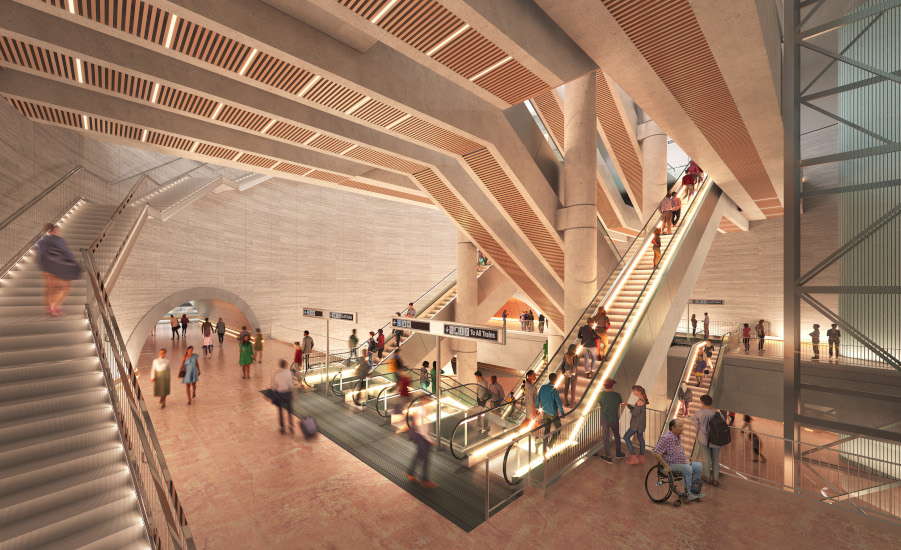Transit
Bechtel Picked as CM for $12.7B Single-bore BART Extension

Phase II of the BART Silicon Valley Extension would add four stations along 6 miles, most of which would be in a single-bore tunnel.
Rendering courtesy Santa Clara Valley Transportation Authority
Efforts to extend Bay Area Rapid Transit service into Silicon Valley are advancing with the Santa Clara Valley Transportation Authority’s (VTA) award of a $490.8-million construction management services contract to Bechtel Infrastructure Corp. and the start of early work. Officials with the VTA are aiming to begin major construction and tunneling for the $12.7-billion BART Silicon Valley Phase II Extension Projectin 2026
The 6-mile extension would add four stations, three of which would have underground platforms. About 5.5 miles of the extension are planned to be tunneled in what VTA says would be the first single-bore subway tunnel in the U.S. The project’s scope also includes construction of a train maintenance and storage site, plus other related facilities.
To bore the tunnel with room for tracks, platforms and other equipment, VTA ordered a 54-ft-dia TBM from German manufacturer Herrenknecht last November. The transportation agency plans to launch the TBM at the west portal, near the Santa Clara end of the extension, and have it dig 30-40 ft per day. The $76-million TBM is scheduled to be delivered next year and 24/7 tunneling is expected to take three to four years.
The project would build on the $2.3-billion, 10-mile Phase 1 completed in 2020 that added BART service to Berryessa/North San Jose. Phase II would extend that line with stops at 28th Street/Little Portugal, Downtown San Jose, Diridon Station and Santa Clara.
“Our goal is to provide efficient, sustainable transit solutions that serve the needs of our growing communities,” said Carolyn Gonot, general manager and CEO of VTA, at a groundbreaking ceremony last month.
As construction manager, Bechtel will oversee four contract packages: systems; tunnel and track work; construction of the Newhall Yard maintenance facility, Santa Clara Station and parking garage; and construction of the three underground stations. VTA previously selected a joint venture of Kiewit Infrastructure West, JF Shea Construction and Traylor Brothers for the first stage of tunnel and track work.
The other firms that proposed for the contract include Arcadis U.S. Inc., Bay Area Connectors and HDR Construction Control Corp., according to VTA.
Passenger service is scheduled to start in 2037. VTA estimates the Phase II extension will carry 54,600 passengers on weekdays by 2040.
The VTA board voted to approve the 10-year cost-plus-fixed-fee CM services contract with Bechtel in April. Bechtel was also part of the joint venture that designed and built the original BART system in the 1960s and oversaw work on Phase I of the Silicon Valley Line.
“This latest rail extension will provide a fast and convenient transit alternative for major commute corridors,” said Kelvin Sims, senior vice president of Bechtel Infrastructure Corp., in a statement.
Bechtel has 15 subcontractors lined up, 11 of which are disadvantaged business enterprises, VTA records show. They have a 12% DBE goal for the contract.
VTA is anticipating more than $6 billion from the Federal Transit Administration to fund the work. Other funding is slated to come from a variety of local, regional and state sources. Officials expect to execute a full funding grant agreement with FTA late this year.



